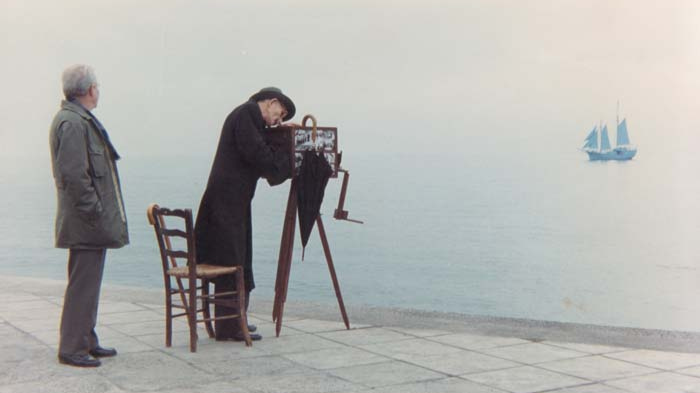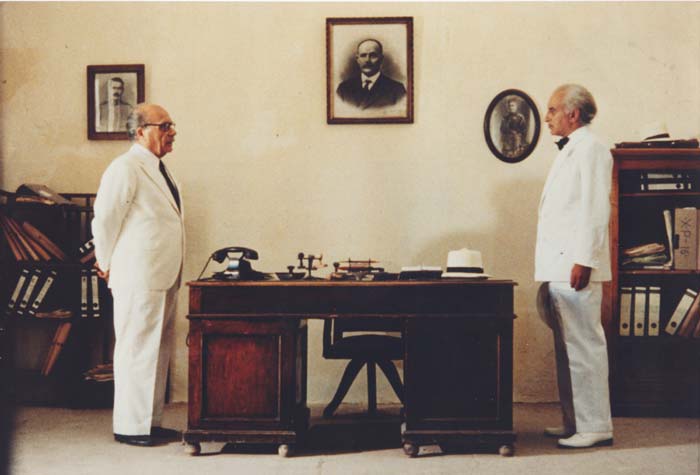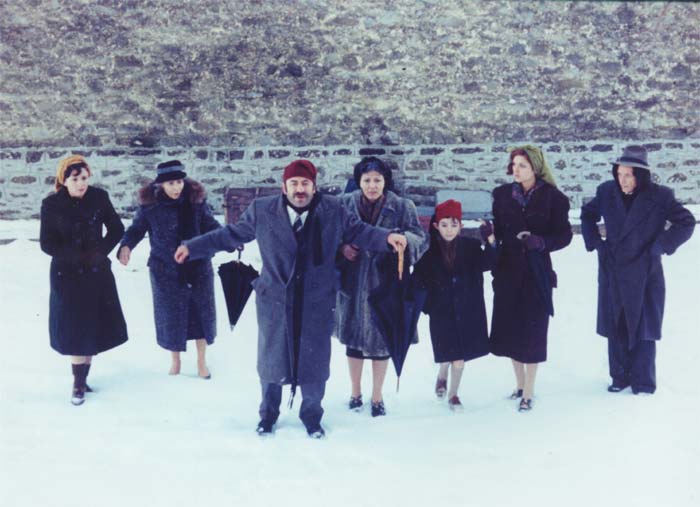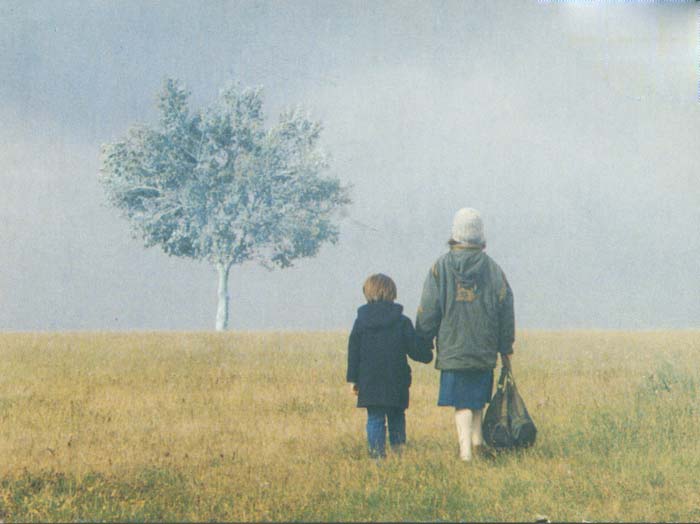Theo Angelopoulos – The Landmark UCLA Retrospective

Review by Malina Stefanovska
In the Fall of 2022, the UCLA Film and Television Archive ran a complete retrospective of Theo Angelopoulos, a Greek film director and one of the most famous and beloved filmmakers of South East Europe. The full house of the Billy Wilder theater, the rapt attention of the audience during the many hours of watching, and all the diverse languages spoken around me, made it obvious that his admirers are not only Balkan born, but also a younger generation of film buffs from all over the world. Angelopoulos has won many premier awards, including the Palme d’Or at the Cannes film festival in 1998 for his film Eternity and a Day. Ulysses’ Gaze (1995), won the Grand Jury Prize at Cannes, and Landscape in the Mist (1988) was a winner at the European Film Awards, but it was The Travelling Players—filmed in 1975, during the military junta’s dictatorship in Greece—that established him as a unique voice in cinematography. UCLA’s timely retrospective, titled “Landscapes of Time: The Films of Theo Angelopoulos,” consisted of all the director’s feature films and a selection of shorts. In addition to the films mentioned above, I saw Days of 36, Voyage to Cythera, Alexander the Great, Meadows in the Mist, and The Hunters.

Having seen and loved Ulysses Gaze when it first came out in 1995, while the civil war was still raging in Yugoslavia, I wanted to see some other Angelopoulos’s films. They are so intimately intertwined with our Balkan history that I was ready to immerse myself in an experience that I knew might be unsettling and unforgettable.
I got more than I expected! I spent many hours in utter nostalgia for my Balkan roots, and the torn, conflicted, and stunning world poetically depicted in his films. It was inevitable that I completely surrendered to Angelopoulos’ meditations on history, reliving or imagining it with all my senses: images, music, the slow passing of time, the long shots of Macedonian villages in winter, the feeling of being part of a community, the exile and oblivion that engulfs it all sevdah, this feeling of sadness for what we have left behind, is the Balkan’s heritage from our common Ottoman past, the Eastern equivalent of the Portuguese saudade.
It is a sadness cultivated through beloved musical traditions, and glorified in poetry and cinematography. In a film modeled after Zorba the Greek, such longing would have been represented by drinking, listening to musicians, and breaking dishes, in a sort of communal catharsis.
None of that gesturing was present in Angelopoulos’ films, and I did not miss the expression of feelings in such demonstrative ways. Yet, as a typical daughter of the Balkan South, I was completely immersed in each of his films, gripped and torn by histories so closely intertwined with my own: my family, from what is now officially North Macedonia, came from both sides of the border; my father fought alongside Greek partisans in World War II, and even learned the language from them; the Manaki brothers (in Greek, Manakis)—whose disappeared reels of film are chased throughout several countries by the hero of Ulysses’ Gaze—lived in Bitola, my family’s hometown, and they were my grandfather’s friends. They both belonged to that Hellenophile ethnic minority, the Vlachs, that once created the city’s culture and is slowly disappearing.
Both on screen and in the audience, I heard long forgotten Greek words from my childhood, and—miraculously—I understood them. Even the recordings of village life by the Manaki brothers, shown in the film, brought back memories of my peasant grandmother teaching me how to spin wool. The bombing of Sarajevo, another beloved city of my youth, made me howl like the protagonist of Ulysses’ Gaze (top image), played by Harvey Keitel.
Needless to say, all the music, from the soulful rebetika to the peasant Macedonian music played by my grandfather, was equally and painfully close to my heart. Even my son’s name, Theodor, chosen in homage to my roots, brought me closer to Angelopoulos! It was as if he spoke exclusively to me, a viewer uniquely familiar with his world.
But then, in the rapt silence of the audience, I realized that something much larger than my own perspective and past connected us all. It was Angelopoulos’s unique cinematography and his understanding of history. This was evident by the audience never saying a word, never leaving before films ended (not even for the Travelling Players, which is over four hours long), in the enthusiastic applause after each show, and in the heartfelt and beautiful opening words delivered by UCLA’s head archivist Paul Malcolm and by Ioannis Stamatekos, the Consul General of Greece in Los Angeles, and Sharon E. J. Gerstel, director of the UCLA Stavros Niarchos Foundation Center for the Study of Hellenic Culture.
Theo Angelopoulos has become known as one of the most important filmmakers of the twentieth century. His career spanned from the early 1970s to 2012, when his last film was brought to a standstill by his tragic death during shooting. He was admired by such auteurs as Bernardo Bertolucci and Wim Wenders for his characteristic style: He used slow, ambiguous, overlapping narrative structures and long takes which often included meticulously choreographed scenes and many actors (The Travelling Players consists of only 80 shots in over four hours of film). He also championed a radical Brechtian point of view where the actors at times broke the fourth wall to deliver their narrative directly to the audience.

Most of Angelopoulos’s films are shot on the northern border of Greece, in rainy and snowy winter weather, in remote mountain villages. He preferred a dark palette of colors diametrically opposing the usual “tourist-sunny” representation of that country. I came to recognize a few recurring visual tropes: rafts or boats slowly gliding away on a river, a snowed-in mountain village, a long frontal take of a group walking up a slope, a conspiratorial whistle of insurgents that carried across the mountainous landscape. These epic and allegorical meaning are always present, to be interpreted at many levels, akin to a myth.
Angelopoulos’s films are as steeped in mythology as they are in recent Greek history or his own personal quest. In Ulysses’ Gaze, the four different women (played by a single actress, Maia Morgenstern), stand for Penelope, Calypso, Circe and Nausicaa, while its hero—a filmmaker named only “A”—is both Odysseus and a stand-in for Angelopoulos as “auteur.” The Travelling Players retells Aeschylus’s Oresteia, with characters ranging from Orestes and Pylades to Electra, Agamemnon, Clytemnestra and Iphigenia replicating the antique tragedies. The fusion and clash between myth and history is in itself the subject of Megalexander, the story of an early twentieth-century insurgent bandit who saw himself as Alexander the Great. What a pity that Angelopoulos did not live to see Alexander’s latest avatar revived, mythologized and re-appropriated as “Aleksandar Makedonski” in the newly-independent (and heavily politicized) State of North Macedonia!
But the main way in which Angelopoulos’ films touched me is not the retelling of myths, as rich as they can be. It is the more recent Greek and Balkan history, and his poetic and complex rendering of our connection with History at large. Some critics have said that “no one but a Greek can understand all the political, historical and mythic allusions.” This might be true, but the main tenets of Angelopoulos’s perspective remain excruciatingly clear.
The civil wars in Greece and some of its Balkan neighbors have taken most of the twentieth century in fits and starts. Fostered in large part by British and American imperialistic agendas and meddling (though swiftly forgotten by the West), these conflicts have been largely erased from the official historical memory of Greece. Yet they remain a submerged component of the proverbial popular pessimism in the region.
Both in The Hunters and The Travelling Players make this obvious in the constant juxtaposition between the 1936-39 civil war, the Second World War, and the civil war of 1947-52 which brought about Greece’s military junta. The unfinished search for a disappeared or fading past is in itself the principal theme of Ulysses’ Gaze. That quest is symbolized by Golpho, a popular pastoral played by itinerant players, that starts over and over but is repeatedly stalled by the interference of historical events. As a play that never ends, its allegorical meaning is clear. So is Angelopoulos’s haunting odyssey, Landscape in the Mist (1988), where the story told by an adolescent girl (named Voula, after the director’s sister) to her younger brother Alexander only provokes his complaint: “This story will never get finished.”

This innocent observation appropriately characterizes Angelopoulos’ cinema. From the absence of the conventional word “End” at the conclusion of his films, to his truly unfinished last one, to his penchant for interweaving variations of his personal history or episodes from earlier films into later ones, he creates a continuous, unfinished work. It is both intimately autobiographical and allegorical. Like the children in Landscape in the Mist, Angelopoulos’s films allow their audiences to cross into a space where the real and mythic intersect to map Greek and Balkan history.

Malina Stefanovska is a professor in the Department of European Languages & Transcultural Studies at UCLA
Originating from a multilingual and multicultural background in ex-Yugoslavia, Malina Stefanovska was educated on three continents: Africa, Europe, and America. She holds a B.A. from Grenoble via Université de Brazzaville, an M.A. from the University of Oregon, and a Ph.D. from Johns Hopkins University.
Professor Stefanovska also worked as an interpreter and translator for French, English, and Serbian, studied Spanish out of love, and wrote and translated literary texts and poetry in several languages. After completing her doctoral thesis on Saint-Simon, which was published as a book in France, Malina further specialized in memoir authors and autobiographical writings of Early Modern France, as well as their modern forms, from the narrative to the visual, from the fictionalized to “auto-fiction” or journal.
She is also a practicing autobiographer and recently completed a manuscript about a Macedonian childhood and family history. Her next project, related to passions and emotions in 17th and 18th century France, will consist in a study of Casanova, written in the form of letters to this author by a reader who admires him.
SUPPORT SEEFEST
Not a member yet? Become an art patron with other SEEfest arthouse aficionados in support of great events and programs, as well as our mission to keep you informed about initiatives from our wide network of fellow cultural organizations.
We Welcome YOU!


First offf I want to say great blog! I had a quick question that I’d
like to ask if you do not mind. I was interested to know how yoou center yourself and clear your mind before writing.
I have had difficulty clearing my mind in getting my ideas
out. I trujly do take pleasure in writing but it
jhst seems like the first 10 to 15 minutes tend
to be lost simply just trying to figure out how to begin. Any
ideas or hints? Kudos! https://Odessaforum.Biz.ua/